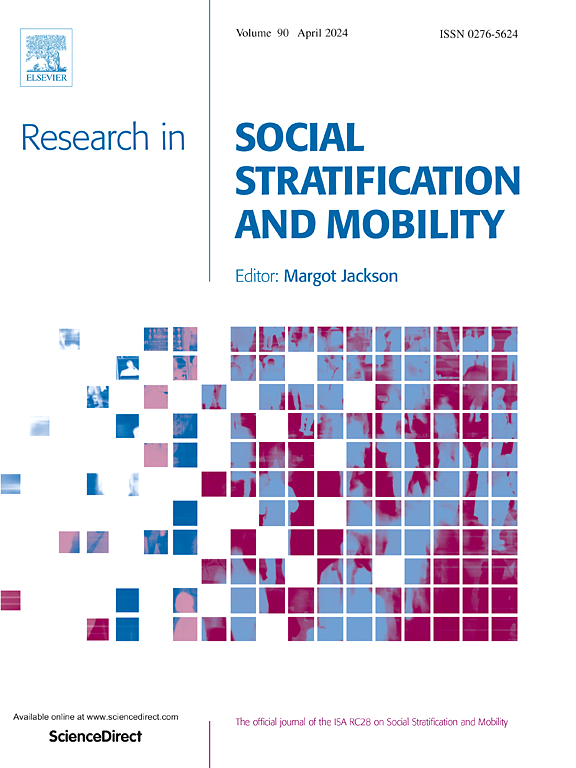Household income mobility in France over the COVID-19 pandemic: Losers and winners of the crisis
IF 2
1区 社会学
Q1 SOCIOLOGY
引用次数: 0
Abstract
Economic hardship induced by the COVID-19 pandemic has mainly been studied over the initial outbreak. We track household income mobility from before to the end of the epidemiological crisis with longitudinal data from France, where welfare support over this period was comparatively strong, possibly protecting households from income loss. In addition to rising inequalities in the overall distribution of household equivalized income attested by income Gini dynamics, downward mobility increased considerably over the crisis (2019–2022) compared to the pre-pandemic years (2016–2019). However, patterns of income loss were independent from COVID-related health conditions and remained largely stable across different social groups from before through the crisis. These findings contradict the idea that the pandemic acted as a ‘great equalizer’, but at the same time do not fully support the view that the crisis exacerbated economic inequalities along the lines of a strict definition of cumulative disadvantage. In fact, we find persistent patterns of exposure to the risks of downward household income mobility from the pre-pandemic period. We interpret these results partially as a reflection of robust welfare transfers in France that turned an otherwise exceptional crisis into a time of ‘business as usual’ for income dynamics. Meanwhile, the ‘winners’ of the pandemic appear to be the households that preserved their income, and have members who largely belong to privileged groups.
新冠肺炎大流行期间法国家庭收入流动性:危机的输家和赢家
新冠肺炎大流行引发的经济困难主要是在疫情爆发初期进行的研究。我们利用来自法国的纵向数据跟踪了流行病危机之前至结束期间的家庭收入流动性,法国在此期间的福利支持相对较强,可能保护了家庭免受收入损失。除了收入基尼系数动态所证明的家庭等额收入总体分配不平等加剧外,与大流行前(2016-2019年)相比,危机期间(2019-2022年)的向下流动性大幅增加。然而,收入损失模式与covid - 19相关的健康状况无关,在危机期间,不同社会群体的收入损失模式基本保持稳定。这些发现反驳了大流行发挥了“巨大均衡器”作用的观点,但同时也不完全支持这样的观点,即危机加剧了经济不平等,这符合严格定义的累积劣势。事实上,我们发现,从大流行前时期开始,家庭收入流动性下降的风险持续存在。我们将这些结果部分地解释为法国强劲的福利转移的反映,它将原本异常的危机转变为收入动态的“一切照旧”时期。与此同时,大流行的“赢家”似乎是那些保住了收入的家庭,他们的成员大多属于特权群体。
本文章由计算机程序翻译,如有差异,请以英文原文为准。
求助全文
约1分钟内获得全文
求助全文
来源期刊
CiteScore
7.80
自引率
6.00%
发文量
46
期刊介绍:
The study of social inequality is and has been one of the central preoccupations of social scientists. Research in Social Stratification and Mobility is dedicated to publishing the highest, most innovative research on issues of social inequality from a broad diversity of theoretical and methodological perspectives. The journal is also dedicated to cutting edge summaries of prior research and fruitful exchanges that will stimulate future research on issues of social inequality. The study of social inequality is and has been one of the central preoccupations of social scientists.

 求助内容:
求助内容: 应助结果提醒方式:
应助结果提醒方式:


